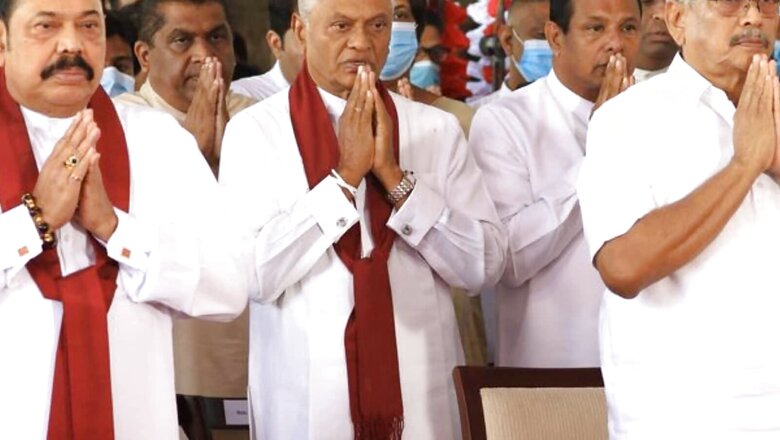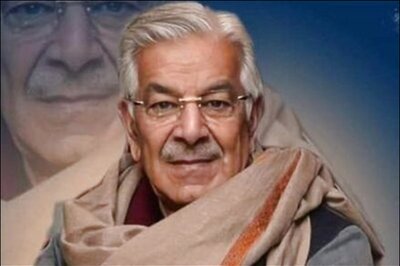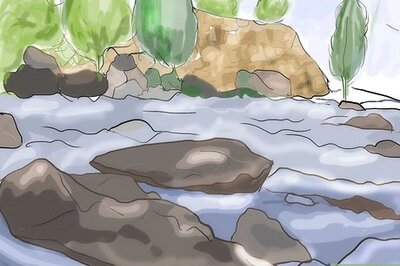In the Eye of the Hurricane as Sri Lanka Simmers, Is It End of the Road for All-Powerful Rajapaksas?

views
As Sri Lanka is in the throes of the country’s worst economic crisis since its independence in 1948, the island nation’s powerful family is now in focus. Angered by the shortages of fuel and other essential items, hundreds of protesters clashed with police and the military outside President Gotabaya Rajapaksa’s residence on March 31, as they called for his ouster, and torched several police and army vehicles.
President Gotabaya Rajapaksa invoked sections of the Public Security Ordinance, which gives him authority to make regulations in the interests of public security, preservation of public order, suppression of mutiny, riot or civil commotion or for the maintenance of essential supplies. A social media blackout was also announced and revoked hours after the government received serious flak for stifling protests.
Following this, 26 ministers in the cabinet — all members except President Gotabaya Rajapaksa and his elder brother Prime Minister Mahinda Rajapaksa — submitted letters of resignation at a late-night meeting on Sunday.
The Rajapaksa Dynasty
The Cabinet has five Rajapaksas — President Gotabaya Rajapaksa (who is also Defence Minister), Prime Minister Mahinda Rajapaksa, Irrigation Minister Chamal Rajapaksa, Basil Rajapaksa, and PM’s son and Sports Minister Namal Rajapaksa. The government has a few more of the Rajapaksa clan holding junior ministerial positions.
Mahinda Rajapaksa
The 76-year-old Rajapaksa brother is the current prime minister of Sri Lanka. Mahinda Rajapaksa served as the island nation’s president from 2005 to 2015 and is highly popular among the ethnic majority Sinhalese for ending the country’s 25-year civil war against Tamil rebels in 2009.
As per UN estimates, around 40,000 civilians were brutally killed by the Sri Lankan armed forces. Mahinda, critics say, did not make proper amends with the minority Tamil community, which is barred from commemorating their war dead.
In 2020, Mahinda staged a political comeback as his party registered a landslide victory winning 145 seats, and with its allies have 150 seats, a two thirds majority in the 225-member parliament. He polled over 500,000 individual preference votes — the highest ever recorded by a candidate in the history of elections.
During his rule Sri Lanka also moved closer to China, borrowing almost $7 billion for infrastructure projects — many of which were mired in corruption.
Gotabaya Rajapaksa
Sri Lanka had been ruled by powerful executive presidents since 1978. But a 2015 constitutional amendment strengthened the parliament and the prime minister and put independent commissions in charge of judiciary appointments, police, public services and the conduct of elections.
Gotabaya Rajapaksa, 72, was elected president last November after projecting himself as the only leader who could secure the country after the Islamic State-inspired bombings of churches and hotels on Easter Sunday that killed 269 people. Since being elected, he has said he had to work under many restrictions because of the constitutional changes.
Dubbed “The Terminator” by his own family, he is feared by foes for his short temper. Gotabaya is currently presiding over the worst economic crisis in decades, and is the main recipient of public anger, apart from Mahinda. People held placards saying “Go Back Gota” outside his residence on March 31, condemning the family’s high hand in mismanagement of the government.
Basil Rajapaksa
Basil Rajapaksa, 70, is a political strategist who managed the economy under Mahinda and is now finance minister. Called “Mr.Ten Percent” in a BBC interview in reference to the commissions he allegedly took from government contracts, subsequent administrations failed to prove any charges he syphoned off millions of dollars from state coffers.
All cases against him have been dropped since Gotabaya became president.
Chamal Rajapaksa
The eldest in the family, the 79-year-old Chamal Rajapaksa was speaker of parliament when Mahinda was president and is also a former minister of shipping and aviation. He currently holds the irrigation portfolio and is number two in the defence department under Gotabaya. Formerly a police officer, he once served as a personal bodyguard to Sirimavo Bandaranaike, the world’s first woman prime minister.
Namal Rajapaksa
PM Mahinda’s eldest son, Namal Rajapaksa is the scion of the family. He entered the parliament in 2010 aged just 24, with a law degree, and is now minister for sports and youth.
During the social media blackout on April 3, Namal Rajapaksa took to Twitter to suggest virtual private network (VPN) as a workaround, while calling on the government — headed by his uncle and father — to lift the ban on social media platforms.
“I will never condone the blocking of social media. The availability of VPN, just like I’m using now, makes such bans completely useless. I urge the authorities to think more progressively and reconsider this decision,” he tweeted.
How did the country get to this point?
Sri Lanka has huge debt obligations and dwindling foreign reserves, and its struggle to pay for imports has caused the shortages. People wait in long lines for fuel, and power is cut for several hours daily because there’s not enough fuel to operate generating plants and dry weather has sapped hydropower capacity.
The country’s economic woes are blamed on successive governments not diversifying exports and relying on traditional cash sources like tea, garments and tourism, and on a culture of consuming imported goods.
The COVID-19 pandemic dealt a heavy blow to Sri Lanka’s economy, with the government estimating a loss of $14 billion in the last two years.
Sri Lanka also has immense foreign debt after borrowing heavily on projects that don’t earn money. Its foreign debt repayment obligations are around $7 billion for this year alone.
According to the Central Bank, inflation rose to 17.5% in February from 16.8% a month earlier. It is expected to continue rising because the government has allowed the local currency to float freely.
(With agency inputs)
Read the Latest News and Breaking News here















Comments
0 comment